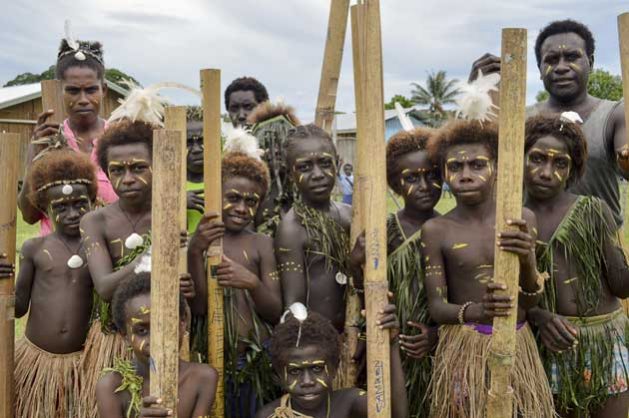Indigenous Peoples Least Responsible for the Climate Crisis
ENVIRONMENT, 20 Aug 2018
Jamison Ervin – Inter Press Service-IPS
9 Aug 2018 – Indigenous peoples, who comprise less than five percent of the world’s population, have the world’s smallest carbon footprint, and are the least responsible for our climate crisis. Yet because their livelihoods and wellbeing are intimately bound with intact ecosystems, indigenous peoples disproportionately face the brunt of climate change, which is fast becoming a leading driver of human displacement.
In Papua New Guinea, for example, residents of the Carteret Islands – one of the most densely populated islands in the country – have felt the effects of climate change intensify over recent years. With a high point on their islands of just 1.2 meters above sea level, every community member is now at risk from sea level rise and storm surges.
Moreover, the community depends almost entirely on fishing for their food and livelihoods, but the health of sea grass beds and coral reefs has gradually deteriorated from warming waters and coral bleaching.
The residents of these islands faced a stark choice – to be passive victims of an uncertain government resettlement program, or to take matters into their own hands. They chose the latter. In 2005, elders formed a community-led non-profit, called Tulele Peisa, to chart their own climate course. In the Halia language, the name means “Sailing the Waves on our Own,” an apt metaphor for how the community is navigating rising sea levels.
In 2014, the initiative won the prestigious, UNDP-led Equator Prize, in recognition for their ingenuity, foresight and proactive approach in facing the challenges of climate change, while keeping their cultural traditions intact.
Earlier this month, Jeffrey Sachs published an article entitled “We Are All Climate Refugees Now,” in which he attributed the main cause of climate inaction to the willful ignorance of political institutions and corporations toward the grave dangers of climate change, imperiling future life on Earth. 2018 will likely be recorded as among the hottest year humanity has ever recorded.
Yet a slew of recent articles highlight that we are not on track to meet the goals of the Paris Agreement. We have not shown the collective leadership required to tackle this existential crisis.
Carteret Islanders have been broadly recognized as the world’s first climate refugees, but they are not alone. Arctic indigenous communities are already facing the same plight, as are their regional neighbors from the island nation of Kiribati.
According to the World Bank, their plight will likely be replicated around the world, with as many as 140 million people worldwide being displaced by climate change within the next 30 years or so.
But the Carteret Island leaders are more than just climate refugees. They have done something precious few political leaders have done to date – they recognized the warning signs of climate change as real and inevitable, they took stock of their options, and they charted a proactive, realistic course for their own future that promised the most good for the most people. Therefore, they could also be called the world’s first true climate leaders.
Let’s hope that our world’s politicians and CEOs have the wisdom, foresight and fortitude of the elders of Carteret Islanders. Because like it or not, we will all be sailing the climate waves on our own, with or without a rudder and a plan.
_______________________________________________
Jamison Ervin is Manager, UNDP’s Global Programme on Nature for Development.
DISCLAIMER: The statements, views and opinions expressed in pieces republished here are solely those of the authors and do not necessarily represent those of TMS. In accordance with title 17 U.S.C. section 107, this material is distributed without profit to those who have expressed a prior interest in receiving the included information for research and educational purposes. TMS has no affiliation whatsoever with the originator of this article nor is TMS endorsed or sponsored by the originator. “GO TO ORIGINAL” links are provided as a convenience to our readers and allow for verification of authenticity. However, as originating pages are often updated by their originating host sites, the versions posted may not match the versions our readers view when clicking the “GO TO ORIGINAL” links. This site contains copyrighted material the use of which has not always been specifically authorized by the copyright owner. We are making such material available in our efforts to advance understanding of environmental, political, human rights, economic, democracy, scientific, and social justice issues, etc. We believe this constitutes a ‘fair use’ of any such copyrighted material as provided for in section 107 of the US Copyright Law. In accordance with Title 17 U.S.C. Section 107, the material on this site is distributed without profit to those who have expressed a prior interest in receiving the included information for research and educational purposes. For more information go to: http://www.law.cornell.edu/uscode/17/107.shtml. If you wish to use copyrighted material from this site for purposes of your own that go beyond ‘fair use’, you must obtain permission from the copyright owner.
